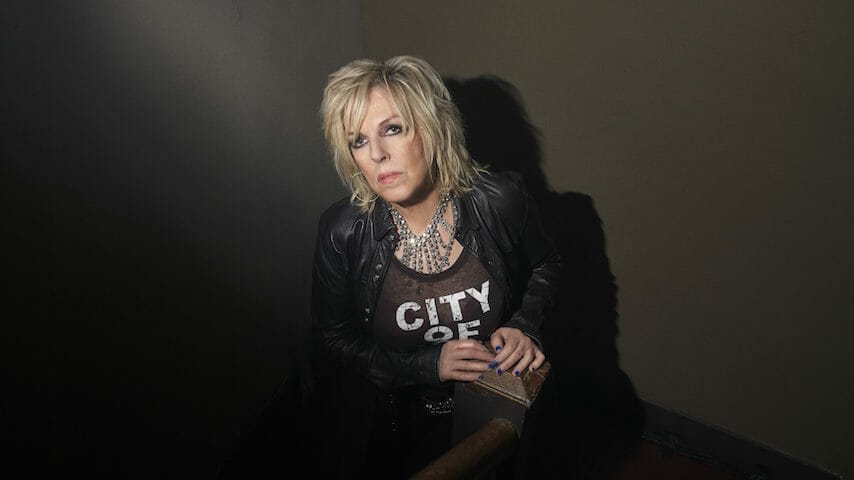Lucinda Williams is One Angry Optimist
The veteran songwriter tells us about her heated new album of protest songs, Good Souls Better Angels, and staying positive
Photo by Danny Clinch
Lucinda Williams is the opposite of every Boomer stereotype. She’s politically enraged, and she’s certainly not worthy of the “out of touch” label slapped on many Boomers. On her new album Good Souls Better Angels, and during a recent phone call, she sounds just as fed up with everything as millennials are.
“It’s pervasive—that feeling that you’re always getting, of being astounded and shocked and pissed off,” Williams, now 67, says. “I’m mad. I’m frustrated.”
The songs on Good Souls, while a perfect snapshot of this enlightened anger, aren’t all brand new. The sludgy blues tune “Bone Of Contention” dates back to 2005, just missing the cutoff for the alt-country troubadour’s 2007 album West. “You’re the splinter in my finger / you’re the knife in my back / you’re the bone of contention,” Williams sings in her signature snarl that has made her a legend in the eyes of so many, sounding more furious than she ever has before. That fury is what makes this album, even the songs that were written a few years earlier, so topical. Similar to the way Fiona Apple’s Fetch the Bolt Cutters resonated so fiercely just a week ahead of Williams’ Good Souls Better Angels, these songs weren’t written about our current state of frenzied pandemic panic, but their arrival during spring 2020 gives them an especially clairvoyant air. Williams, one of the most decorated songwriters in Americana music, describes this phenomenon as “ironic.”
“The political stuff is still all the same, so that’s no surprise, but, now we’ve got this pandemic—it’s almost kind of biblical. We got hit by a tornado first,” she adds, referencing the tornado that blew through Nashville in early March, bringing devastation to the East Nashville neighborhood where many country artists—including Williams and her husband/manager/co-producer Tom Overby—live and work.
“They’re not really protest songs as much as songs about humanity and the human condition,” she says of the new material, also citing “Soldier’s Song,” from her album Blessed, as one of her first forays into writing protest music. But where “Soldier’s Song” may carry only vague anti-war sentiments, the songs on her 14th studio album are undoubtedly responses to social and political issues.
The Louisiana-born Williams, whose landmark album Car Wheels On A Gravel Road (produced by Ray Kennedy, who returns for this project) turned 20 in 2018, has always been on the fringes of mainstream country, often in the same camp as other new-age “outlaws” like Steve Earle, Gillian Welch and Buddy Miller. As Williams herself points out, her music hasn’t always been everyone’s cup of tea—“This is the most probably outspoken I’ve ever been on an album, and it’s not going to appeal to everybody probably, not that all my stuff did before either”—but that’s not necessarily because she was too politically forthright. She was just always doing something different—brilliant, but unlike anything you’d hear from her contemporaries at the forefront of ’90s pop-country. She rambled. She shouted. She always sounded like she just came inside from a smoking break. There was a rebellious aura radiating from her every word and melody, on everything from her rocking 1979 debut Ramblin’ to her passionate record of love songs Essence to her most recent effort, 2016’s The Ghosts of Highway 20.
With this album, though, and all the political noise we’re privy to every single day, she finally has a chance to get a little more fired up, mirroring the work of artists she grew up listening to in the 1960s: The rabble rousers of the day, like Bob Dylan and Woody Guthrie.
“You don’t want to sugarcoat everything,” she says. “You hear this all the time, like ‘You need to shut up and just play music.’ There’s a lot of that. What if people said that to Woody Guthrie? I grew up in that time period when protest songs and all that—it was everywhere, songs against the war in Vietnam and Kent State and the Civil Rights era. Artists were speaking out about all that stuff, and then it kind of died down for a while, you know? But now I think with the situation that we’ve been under, I’m starting to see it kind of come out more.”
-

-

-

-

-

-

-

-

-

-

-

-

-

-

-

-

-

-

-

-

-

-

-

-

-

-

-

-

-

-

-

-

-

-

-

-

-

-

-

-








































